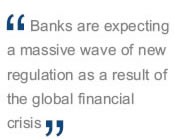Goldman Sachs España: Developing a compliance culture
Different companies may take different approaches to their compliance issues, but what is most important is that they recognise the need to do so

There is no single correct approach companies should take to managing compliance issues. There are differences even among businesses in the same sectors, says Pilar Aranguren, Executive Director, Compliance at Goldman Sachs España.
This shows, she says, that the driving force must be the business own strategic needs and corporate structure. ‘The role that a local Madrid compliance officer is performing could be somewhat different to that performed even by their peers in other locations.”
Another obvious issue is a company’s own definition of what compliance means, and therefore what oversight it requires. In Spain compliance does, however, have a legal definition and has also been broadly defined at European level: to encompass advice offered to a business in order to control the company’s operations in accordance with the relevant regulations.
Despite the breadth of such a definition a business may, however, take one of two approaches to the positioning of the compliance function, believes Aranguren.
‘Compliance can either be aligned with the company’s legal department, and take on an advisory role to the business, or be more closely aligned to the audit function and undertake a control and surveillance role.
As a lawyer herself, Aranguren is comfortable taking on a quasi-legal role, albeit she has an entirely independent position, and reports directly to the Head of Compliance EMEA, who then reports to Goldman Sachs headquarters in New York. There is, however, no requirement in Spain that the compliance role be performed by a lawyer.
‘What is clear, however, is that my client is the business, not the Board. You must bear in mind that Goldman Sachs is a very large multinational organisation. What is right for us may not be right for a domestic Spanish business where, for example, a compliance officer may report direct to the Board, the General Secretary or even the CEO.’
She notes that within the international banking sphere her situation is not necessarily unique. Other banks also separate the legal and compliance functions.
‘It is not possible to define the differences between individual companies by their compliance culture, but what is clearly important is that a business has one. What is significant is that the issues on which compliance focuses are usually distinct from the company’s day-to-day legal issues – albeit we may have responsibility to appoint external law firms to help us deal with them.’
The coming years will, of course, bring new and difficult challenges to the compliance function, in Spain and elsewhere, and particularly for the banking sector, she believes.
Notable has been the impact of The Markets in Financial Instruments Directive (MiFID), which came into force in December 2007, amending Spanish Securities Market legislation.
This introduced significant reforms to the investment services regime, including re-characterising investment advice as a regulated service and creating and recognising a new type of investment firm (EAFIs) devoted to the provision of investment advice – the framework for which only came into force in January 2009.
‘Banks are expecting a massive wave of new regulation as a result of the global financial crisis, having already been impacted by MiFID. A further challenge will be the possible effects of the European Commission’s (EC) efforts to bring greater regulation to the hedge fund and private equity sectors,’ she says.
The EC published a draft Directive in April, in response to the perceived need to control systemic risks, and has as its principle objectives investor protection and transparency, aimed at funds with €500m under management.
The long-term challenge, Aranguren believes, is to bring a more professional approach to the compliance function in Spain.
‘Different approaches will inevitably be taken by each business as to how they manage their own issues, but as a profession we need also to address issues such as the establishment of common standards, rules and protocol.’











